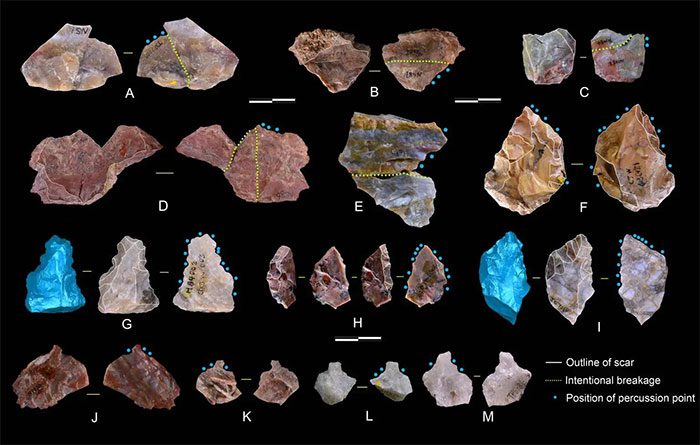Ancient humans arrived in what is now China much earlier than previously thought and possessed highly advanced technology.
A new study led by Professor PEI Shuwen from the Institute of Vertebrate Paleontology and Paleoanthropology (IVPP) of the Chinese Academy of Sciences and Professor Ignacio de la Torre from the Institute of History at the Spanish Council for Scientific Research has altered the timeline of human evolution.

The treasure of artifacts excavated in China marks a significant milestone in human history – (Photo: PNAS).
According to a publication in the scientific journal PNAS, they analyzed a valuable collection of artifacts excavated from the Nihewan Basin (Hunan Province, China) and discovered that they are 1.1 million years old.
Surprisingly, the technology used to manufacture these Stone Age tools is Mode 2, which is a more advanced method than the primitive Mode 1.
Mode 2 is characterized by several techniques of intentionally flaking off pieces from the rock block, with a standardized production process. Additionally, some tools exhibited perforations.
A significant number of stone fragments, separated from the tools during manufacturing, were also found, showing a certain degree of similarity and providing compelling evidence of this standardization, according to SciTech Daily.
Mode 2 represents a leap forward in the technology of early humans, being more complex, elaborate, and useful than its predecessor Mode 1.
Previously, it was believed that technology in East Asia had long remained in the Mode 1 category.
This recent discovery offers two important new data points:
- First, ancient humans appeared in East Asia, particularly in what is now China, much earlier than previously understood.
- Second, they possessed highly advanced technology, developing Mode 2 tool-making skills at least 300,000 years earlier than previous data suggested.
Thus, East Asia may not be the first location on Earth where Mode 2 emerged; however, it is one of the earliest places where humans with this technology arrived and settled. Therefore, human history may need to be rewritten once again.



















































